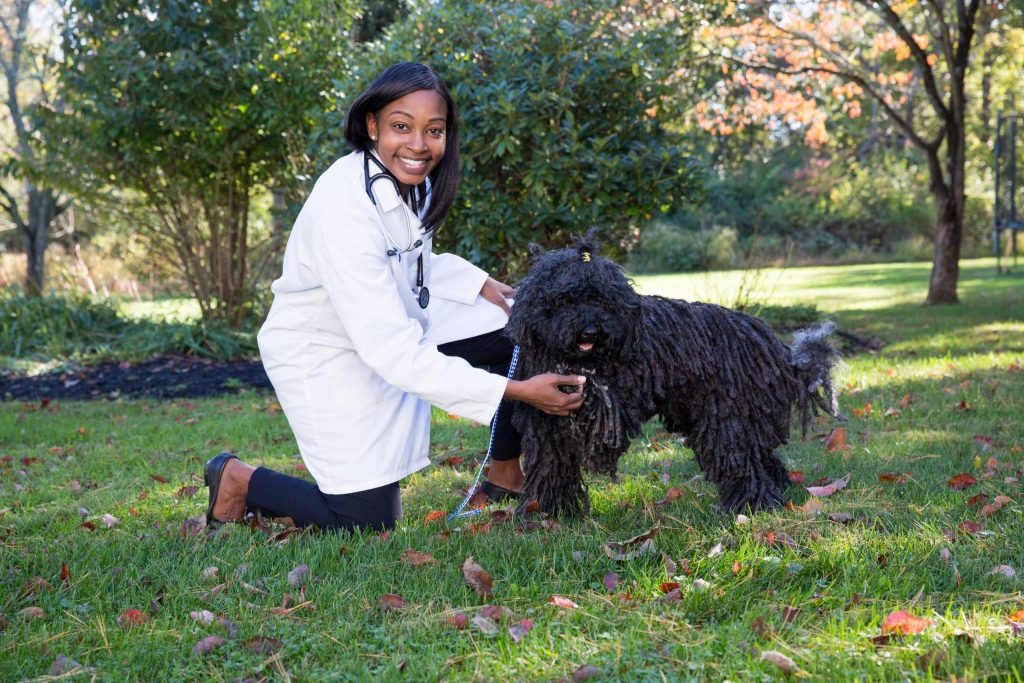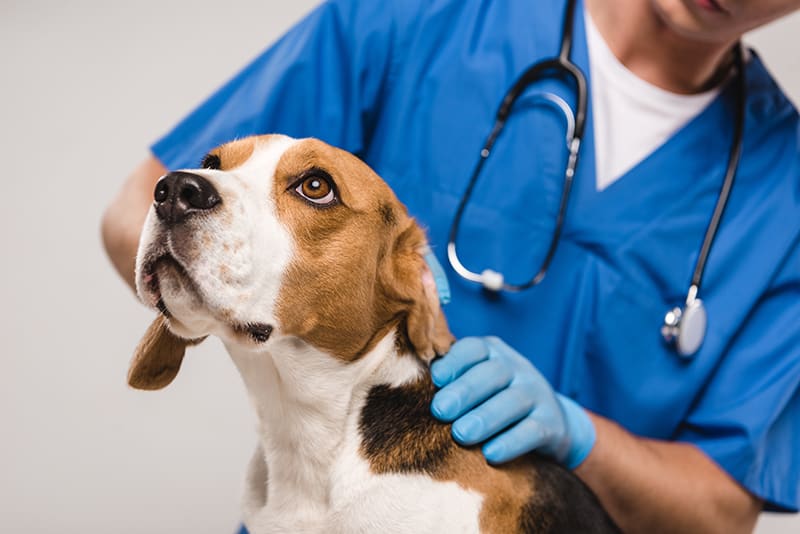Veterinary Cancer Specialist answers common pet cancer questions
Comprehensive Overview to the Services Used by a Veterinary Oncologist
Vet oncology incorporates a vast variety of services focused on diagnosing and dealing with cancer cells in animals. Veterinary Cancer Specialist. Oncologists employ innovative diagnostic methods and use different therapy choices tailored per animal's demands. They likewise prioritize encouraging treatment and offer important sources for pet dog proprietors. Recognizing these solutions is important for making educated decisions. What certain aspects of vet oncology can especially impact a family pet's therapy journey?
Comprehending Vet Oncology
Vet oncology is a specialized field concentrated on detecting and treating cancer cells in animals. This discipline includes a vast array of methods, from medical therapies such as radiation treatment and immunotherapy to medical treatments aimed at removing growths. Vet oncologists are educated to identify the unique symptoms of cancer in different types, allowing them to tailor therapy strategies to specific people.
In enhancement to traditional treatments, vet oncology emphasizes supportive treatment, which plays a vital function in improving the lifestyle for afflicted animals. This includes pain management, nutritional support, and palliative care choices. Partnership with family pet owners is important, as they are important to decision-making regarding their animals' treatment paths. As study advancements, veterinary oncology remains to advance, offering new hope and enhanced results for animals diagnosed with cancer cells. In general, this field is fundamental for addressing the intricacies of cancer cells in companion pets.
Advanced Diagnostic Techniques
Advanced analysis strategies play a crucial function in veterinary oncology, providing critical understandings right into the existence and extent of cancer cells in animals. Imaging modalities such as ultrasound, CT scans, and MRI are generally utilized to imagine tumors and analyze their attributes. Additionally, biopsy treatments are essential for obtaining cells examples, enabling clear-cut medical diagnosis and tailored treatment strategies.
Imaging Modalities Utilized
Imaging techniques play an important duty in the diagnosis and monitoring of cancer cells in animals. Vet oncologists use various sophisticated imaging techniques to examine tumor dimension, metastasis, and visibility. Radiography, or X-rays, uses an initial view of bone and breast problems, while ultrasound offers real-time imaging of soft cells, permitting thorough evaluation of interior body organs. Computed tomography (CT) improves visualization of intricate anatomical structures and makes it possible for 3D repairs, aiding in exact lump localization. Magnetic resonance imaging (MRI) is vital for soft cells differentiation, especially in mind lumps. In addition, nuclear medicine strategies such as positron exhaust tomography (FAMILY PET) help identify metabolic activity within growths. Jointly, these methods enhance diagnostic precision, leading effective treatment techniques for oncological individuals.
Biopsy Treatments Explained
Complying with the preliminary evaluation with imaging methods, getting a definitive diagnosis commonly needs cells tasting with biopsy treatments. Veterinary oncologists make use of numerous biopsy strategies based upon the growth's place and attributes. Great needle desire (FNA) is a minimally intrusive approach that removes cells for cytological exam, perfect for surface masses. Core needle biopsies supply bigger tissue examples and are valuable for much deeper growths, allowing for histopathological analysis. Surgical biopsies involve excising a section or the whole growth, assisting in complete analysis. These treatments not just confirm the presence of cancer cells yet likewise help determine its kind and quality, assisting treatment choices. Each biopsy technique is chosen very carefully to balance diagnostic precision with client safety and security and convenience.
Treatment Choices for Cancer in Family pets
When a pet is detected with cancer cells, a variety of therapy options come to be available to assist manage the illness and improve quality of life. Veterinary oncologists commonly suggest a multidisciplinary approach customized to the specific pet's needs, which may consist of surgical treatment, radiation treatment, immunotherapy, or alternate treatments.
Surgery is usually used to eliminate tumors and afflicted cells, potentially bring about full remission in some instances. Radiation treatment intends to target and destroy cancer cells, minimizing lump size and easing signs and symptoms - Pet Cancer Surgery. Immunotherapy harnesses the animal's body immune system to deal with cancer cells more efficiently, while alternate treatments may consist of acupuncture or organic supplements to sustain total health
Each treatment option carries its own benefits and risks, and veterinary oncologists work carefully with pet owners to design a complete strategy that lines up with the family pet's certain medical diagnosis and the proprietor's desires. The utmost goal is to enhance the animal's comfort and quality of life throughout their cancer trip.
Radiation treatment for Pets
Chemotherapy is a common treatment alternative for pet dogs detected with cancer cells and is typically utilized in conjunction with other treatments detailed by veterinary oncologists. This treatment entails the management of certain medications designed to target and destroy cancer cells, consequently decreasing tumor dimension and stopping the spread of the illness. Veterinary oncologists customize chemotherapy protocols based upon the kind of cancer, the pet dog's general health, and the wanted therapy result.
Negative effects can take place, as these drugs might likewise influence healthy cells. Typical reactions consist of nausea, throwing up, and temporary modifications in hunger - Board Certified Veterinary Oncologist. Veterinary oncologists are equipped to handle these negative effects properly, guaranteeing the pet's comfort throughout the therapy process. Normal monitoring via blood tests and follow-up visits is important to examine the pet's action to radiation treatment and make required changes. Ultimately, radiation treatment can provide considerable advantages, enhancing the lifestyle for pet dogs facing cancer medical diagnoses

Radiation Therapy in Vet Medicine
Radiation treatment functions as an effective therapy option for pet dogs identified with local growths, using a targeted strategy to cancer monitoring. This method utilizes high-energy radiation to harm the DNA of cancer cells, inhibiting their capability to multiply. It is especially beneficial for lumps that are not amenable to medical elimination or for situations where surgery may not be viable because of the lump's location.
Vet oncologists customize radiation procedures based upon tumor location, size, and kind, as well as the animal's total health. Treatment can be supplied via outside light beam radiation or brachytherapy, each with distinct advantages. Normally, multiple sessions are required to make best use of effectiveness while decreasing negative effects.
Pet dogs may experience short-term reactions such as skin inflammation, the general goal is to reduce lumps and relieve symptoms, ultimately improving the pet's prognosis and quality of life. Accordingly, radiation therapy plays an important function in extensive cancer care.
Palliative Care and Lifestyle
Palliative care in vet oncology concentrates on boosting view it the high quality of life for family pets dealing with terminal diseases, guaranteeing comfort and self-respect in their last days. This specialized approach focuses on discomfort administration, sign control, and emotional assistance. Vet oncologists evaluate each animal's individual demands, customizing interventions to reduce pain and boost general well-being.
Strategies may include administering drugs for pain relief, taking care of queasiness, and addressing various other stressful symptoms. In addition, dietary support is usually supplied to maintain toughness and improve cravings. The emotional aspect of palliative treatment is equally vital; creating a tranquil atmosphere helps in reducing anxiety for both family pet and owner.
Inevitably, the goal of palliative their explanation treatment is to allow pet dogs to enjoy their continuing to be time with as much delight and self-respect as possible. By concentrating on convenience and lifestyle, vet oncologists play a vital duty in guaranteeing that pet dogs and their families browse this tough journey with concern and understanding.
Assistance for Animal Owners Throughout Treatment

Psychological Guidance for Proprietors
Charting the emotional landscape during a pet dog's cancer therapy can be an overwhelming experience for owners. The unpredictability surrounding medical diagnosis and diagnosis can result in sensations of vulnerability, sadness, and stress and anxiety. Vet oncologists recognize the value of psychological support and commonly provide assistance to assist proprietors navigate this tough trip. Communication is important; going over therapy alternatives and potential outcomes can ease some anxieties. Additionally, offering peace of mind that emotional actions are legitimate fosters an encouraging setting. Several oncology clinics may also suggest support system or counseling services customized for pet owners, facilitating shared experiences. Encouraging owners to prioritize self-care during this time is vital, as their emotional health straight affects their family pet's convenience and general treatment experience.

Resources and Educational Materials
Steering via the intricacies of a family pet's cancer therapy can be daunting for owners, making accessibility to trusted sources and educational products important. Vet oncologists commonly offer a selection of handouts, sales brochures, and online materials that discuss therapy choices, potential adverse effects, and care methods. These sources assist debunk the process and encourage family pet owners to make educated choices. Furthermore, lots of oncology facilities see here offer accessibility to support discussion forums and teams where proprietors can get in touch with others dealing with comparable challenges, promoting a sense of area. Educational webinars and workshops conducted by veterinary specialists additionally enhance understanding, ensuring that owners are well-equipped to navigate their animal's journey through cancer therapy with self-confidence and expertise.
Often Asked Inquiries
How Can I Prepare My Animal for a Vet Oncology Go To?
Preparing a pet dog for a vet oncology visit includes celebration clinical documents, noting signs, and making sure the pet dog is comfortable. A calm attitude and acquainted things can help ease stress and anxiety during the visit.
What Are the Indicators My Pet Dog May Have Cancer Cells?
Signs that a pet may have cancer include unexplained fat burning, relentless throwing up or looseness of the bowels, uncommon swellings or swellings, sleepiness, adjustments in cravings, trouble breathing, and changes in habits. Trigger vet interest is necessary.
Just How Can I Assistance My Family Pet Mentally During Treatment?
Supporting a pet psychologically throughout therapy includes offering comfort, maintaining regimens, supplying mild affection, and guaranteeing a calm environment. Taking part in silent play and routine companionship helps reduce stress and fosters a feeling of protection.
Exist Alternate Therapies for Pets With Cancer?
Different treatments for animals with cancer consist of acupuncture, organic treatments, and nutritional assistance. These techniques may complement standard therapies, promoting total wellness. Consulting with a veterinarian is essential for secure and efficient combination of alternative treatments.
What Costs Should I Expect for Veterinary Oncology Providers?
The awaited expenses for veterinary oncology solutions can vary considerably, usually affected by diagnostics, treatments, and recurring treatment. Animal owners must get ready for expenses varying from examinations to specialized therapies, mirroring the intricacy of cancer administration.
Collaboration with pet dog owners is critical, as they are important to decision-making regarding their pet dogs' treatment courses. Each therapy choice lugs its own advantages and risks, and vet oncologists function carefully with pet owners to design a comprehensive plan that lines up with the pet's details medical diagnosis and the owner's wishes. Family pets might experience short-lived responses such as skin irritability, the overall aim is to reduce growths and relieve symptoms, eventually enhancing the pet dog's diagnosis and high quality of life. Support for family pet owners during therapy is vital in guiding with the emotional challenges connected with an animal's cancer diagnosis. Preparing a family pet for a vet oncology go to involves event medical records, noting symptoms, and guaranteeing the animal is comfortable.